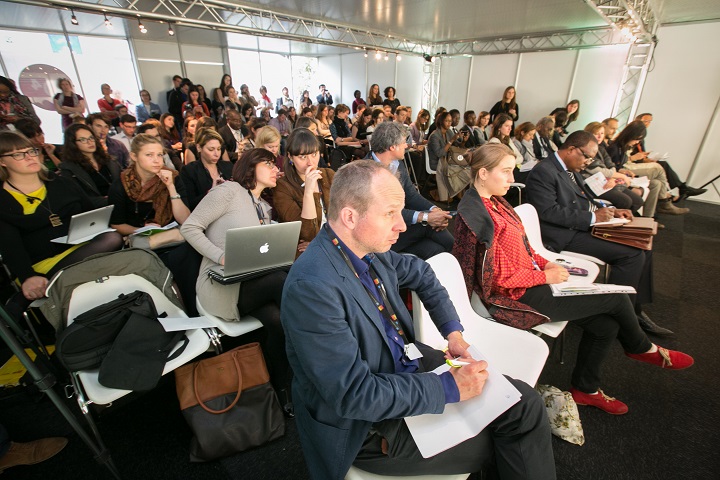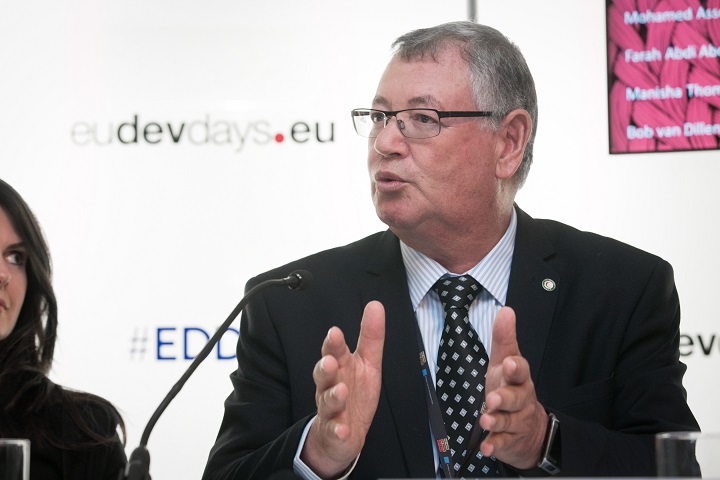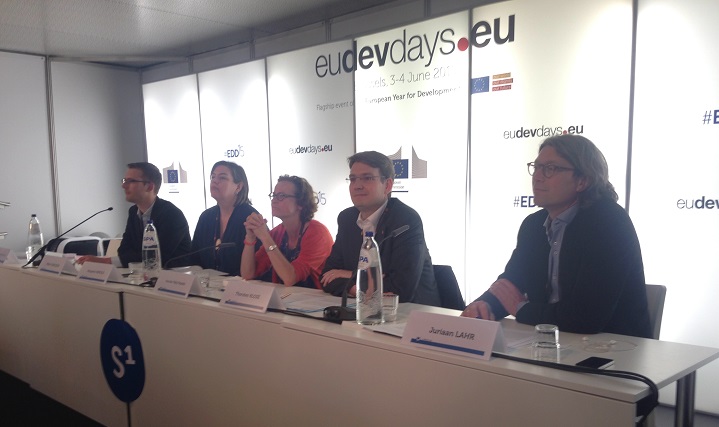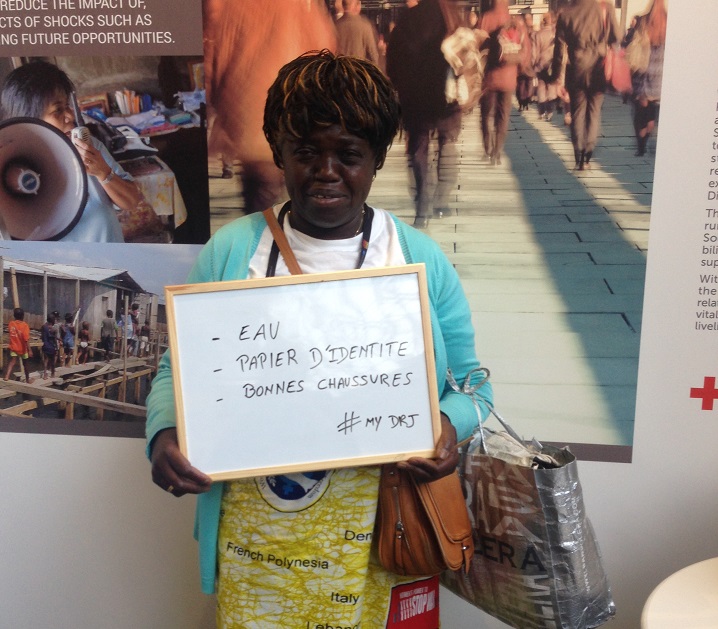The Red Cross Red Crescent at European Development Days 2015
![]()
This year, the European Development Days (EDD15) echoed the motto of the European Year for Development (EYD2015) - "Our world, our dignity, our future". Gathering thousands of participants in Brussels on 3-4 June, the forum provided an opportunity for political leaders, development practitioners, the private sector, and civil society organisations to debate and share best practices in the fields of development cooperation, human rights and humanitarian aid.
Migration and development
On 3 June, the Red Cross EU Office held the joint lab session "Migrants matter for development: New actors and energies in a new development agenda”, in collaboration with the European confederation of Relief and Development NGOs (CONCORD), ICMC Europe, the Joint Migration and Development Initiative (JMDI) and the United Nations High Commissioner for Refugees (UNHCR). The session focused on the players and dynamics impacting future migration and development efforts. Participants discussed the kinds of innovative partnerships and approaches that can contribute to real positive changes on the ground for all migrants and their communities, based on the practical experience of a variety of projects and initiatives.

Migration is a growing phenomenon that occurs in every country. While many migrants move voluntarily – perhaps looking for economic opportunities or better living conditions – others do not have a choice. More and more people are forced to flee their homes and communities because of factors such as conflict, insecurity, disaster or poverty. Lots of migrants succeed in establishing themselves in their new communities, but others face abuses and discrimination; and these are of primary concern for National Red Cross Red Crescent Societies and the International Federation of Red Cross and Red Crescent Societies (IFRC).
As migration is a global phenomenon, partnerships with government and non–governmental agencies, migrant groups and host communities are essential along the many migration trails. During the lab, Mohamed Assouali, Head of Operations at the Moroccan Red Crescent and the national focal point for the Rights of Migrants in Action project, explained how the Moroccan Red Crescent is engaged in assisting migrants and gathering information about migration in Morocco. The project aims to promote and protect the human rights of migrants in targeted countries, migration corridors and regions through globally coordinated civil society action, with a specific focus on migrant domestic workers and victims of human trafficking.

Mr Assouali underlined the need to address migration with global partnerships, particularly for the eradication of trafficking of migrants. He also highlighted the key contribution that civil society organisations make to supporting the rights and dignity of domestic workers and trafficked persons, and reiterated the importance of building and strengthening their capacities.
Scalling up resilience
On 4 June, the lab session "Innovative approaches in scaling up inclusive community resilience” gathered senior representatives from the Red Cross Red Crescent Climate Centre, the Netherlands Red Cross, the German Red Cross, the World Bank's Global Facility for Disaster Reduction and Recovery (GFDRR) and the European Commission's Department for Humanitarian Aid and Civil Protection (ECHO) who shared examples of how the humanitarian-development gap is being bridged to strengthen resilience at the necessary scale.
Despite decades of investment in policies and programmes to reduce disaster risk, the social and economic costs of disasters continue to rise, particularly among poor communities in developing countries. Persistent poverty, environmental degradation, annd unplanned urbanization among other factors, increase exposure and vulnerability. Climate change compounds these risks as the probability of extreme weather events grows.

As the climate continues to change, millions of vulnerable people will face greater challenges in terms of health, food and water security, and livelihoods. To tackle this, a much stronger focus is needed on poverty reduction and addressing the underlying causes of vulnerability, including through ecosystem management.
Thorsten Klose, Head of the Programme Support and Resilience Unit at the German Red Cross, shared experiences from pilot projects in Uganda and Togo which are funded by the German Federal Ministry for Economic Cooperation and Development (BMZ), which are supporting local communities to increase their disaster preparedness by taking early action based on scientific information and early warnings. Scientific information and early warnings provide a window of opportunity before a potential disaster occurs in which local communities can take action. "Defining action by the use of scientific information would allow for more efficient use of funds", he said.
Juriaan Lahr, Head of International Assistance at the Netherlands Red Cross described Partners for Resilience (PfR), an alliance of five Netherlands-based humanitarian, development, climate and environmental organisations and their local partners in nine countries worldwide. By integrating short and long-term climate information, and ecosystem management and restoration into disaster risk reduction, partners use different strategies to increase the resilience of vulnerable people in disaster-prone areas. Mr Lahr underlined the importance of treating local communities as active partners with expertise in building resilience, as well as the value of bridging the gap between different levels (individual, household, local, sub-national, national and global), and understanding the complementary roles of different actors and institutions.
Both lab sessions were attended by over 90 representatives from the European institutions, international organisations, civil society organisations, journalists and other stakeholders.

As well as participating the Migration and Development in Action stand, the Red Cross EU Office ran a stand on the Disaster Resilience Journal, showcasing a wide variety of Red Cross Red Crescent resilience programmes and activities. EDD participants were invited to explore the interactive web documentary that shows how individuals, communities and countries around the world are adapting to the effects of climate change, and other social, cultural and economic shifts. Participants also reflected on their own disaster preparedness by taking a selfie with an indication of the 3 things that they would have in the go bag.
For media inquiries, please contact Eva Oyón on: eva.oyon@redcross.eu or +32 2 235 09 22

